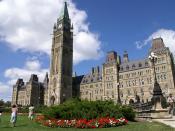In the late 1700's, government ran the economy in a country. Colonies were tightly controlled and little freedom was granted merchants. Due to this way of economic life, in 1776 Adam Smith wrote a book entitled "The Wealth of Nations"ÃÂ. In it, he listed three economic questions that need to be answered. He suggested that any economic system must be able to answer: "What goods should be produced, How are they to be produced and who should have them?"ÃÂ Adam Smith suggested a system with little government involvement, with profit and competition being the motivation behind quality goods at reasonable prices. This was known as Capitalism.
At the same time, Karl Marx was questioning economic systems as well. However, he wrote about a system know as communism or command economy, in which the government tightly controlled the economy to prevent anyone from becoming poor or rich. Everyone would be equal, working for the common good.
So the question facing a country's economy style was, should there be government involvement. Basically, Capitalism or Communism? The problem is neither system in its true form can work. Pure capitalism is very hard to achieve, as it encounters problems such as monopolies, oligopolies, vast extremes from poor to rich and "ÃÂboom and bust' cycles, which damage the economy. Communism however, had bigger problems. With no incentive, conformity to state and severely limited human rights, communism has become a hated economic system. So what is the answer to the extent of government involvement in planning the economy? The answer lies with a balance of the two know as Mixed Economy.
Mixed Economies exist where government and people live in economic balance. Mixed Economies lie in the middle of the economic spectrum, with some government intervention. The question now becomes, not should government interfere with planning...


